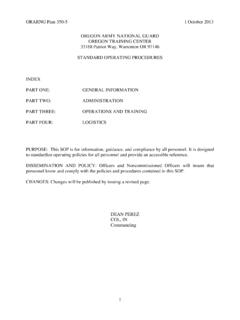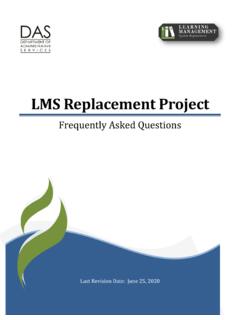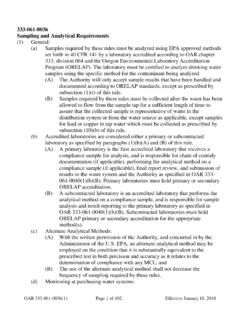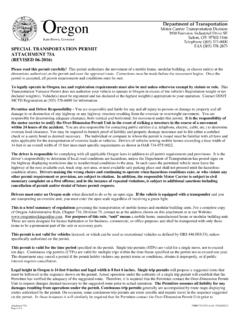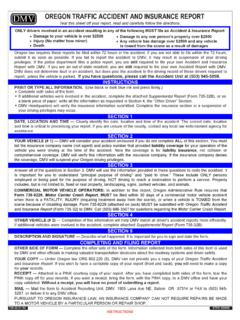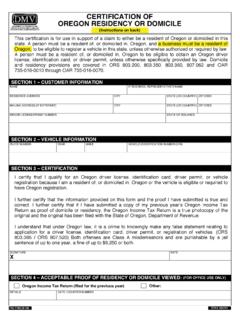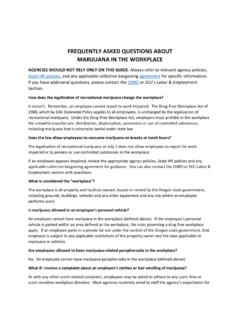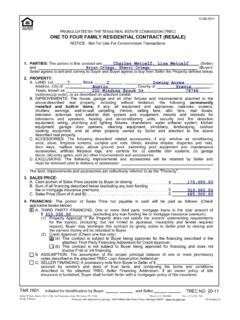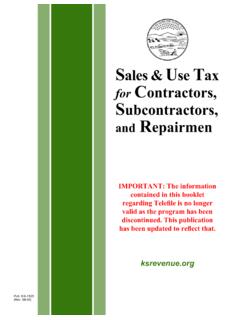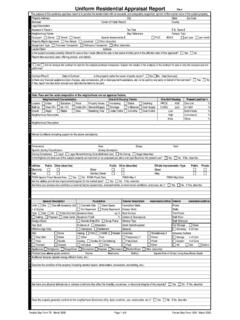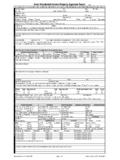Transcription of CCB LICENSE ENDORSEMENTS - oregon.gov
1 1 CCB LICENSE ENDORSEMENTS Selecting an endorsement is related to the type of structure that an applicant intends to construct or develop. Contractors with a residential endorsement may work on residential and small commercial structures. Contractors with a commercial endorsement may work on both large and small commercial projects. Contractors that perform work on residential and large commercial structures must have both a residential and a commercial endorsement. Contractors that have both a commercial and residential ENDORSEMENTS , must have TWO bonds (one for each endorsement) and ONE liability insurance policy in the higher amount required under the ENDORSEMENTS you choose. The statutory definition for these three types of structures is below: TYPE OF STRUCTURE DESCRIPTIONS EXAMPLES residential Structure A site-built home A structure that contains one or more dwelling units and is four stories or less above grade A condominium, rental residential unit or other residential dwelling unit that is part of a larger structure, if the property interest in the unit is separate from the property interest in the larger structure A modular home constructed off-site A manufactured dwelling A floating home Single-family residence Apartment complex or condos 4 stories or less Individual units in a high rise building Does not mean: Motels/Hotels Dormitories Prisons/Jails Summer camps Small Commercial Structure A nonresidential.
2 Structure of 10,000 square feet or less and not more than 20 feet high OR Leasehold, rental unit or other unit that is part of a larger structure, if the unit has 12,000 square feet or less and not more than 20 feet OR Structure of any size for which the entire contract price of all construction work to be performed on the structure does not total more than $250,000 7-11 stores Gas stations Fast food restaurants Tenant space in malls Under $250,000 construction projects Large Commercial Structure Any structure that is not a residential structure or small commercial structure Apartment Complex or Condos more than 4 stories Hospitals Parking Garages Shopping Malls Manufacturing Facilities CONTINUED ON NEXT PAGE 2 residential ENDORSEMENTS Endorsement Classifications Scope of Work Limitations Bond and Insurance residential General Contractor (RGC) These contractors may supervise, arrange for, or perform (partly or completely) an unlimited number of unrelated building trades involving any residential or small commercial structure or project.
3 residential general contractors may perform the same work as residential specialty contractors. $20,000 residential bond $500,000 per occurrence insurance residential Specialty Contractor (RSC) These contractors perform work involving one or two unrelated building trades for residential or small commercial projects. Alternatively, these residential contractors may perform work on a single property involving three or more unrelated building trades if the contract for labor and materials is $2,500 or less. The building trades may change from job to job. Example: A residential specialty contractor may perform masonry & roofing work on one project & concrete work on another. $15,000 residential bond $300,000 per occurrence insurance residential Limited Contractor (RLC) These contractors may supervise, arrange, and/or perform an unlimited number of unrelated building trades involving residential or small commercial structure projects that meet all of the following: 1.
4 Will not perform work exceeding $40,000 in gross annual volume. 2. Will not enter into contracts to perform work as a contractor that exceeds $5,000. 3. Will not perform work that exceeds $5,000 per job site per year. 4. Understands that if gross construction business volume exceeds $40,000 during the year, the law requires the contractor to immediately notify the CCB, change their endorsement, and increase their bond and insurance coverage, if required. This is for part-time contractors who, for example, build for a hobby, for retirees, or for maintenance type of services. CCB may inspect oregon Department of Revenue tax records to verify business volume. Gross sales and gross business volume refer to the amount you received for services before any expenses (taxes, labor, supplies, etc.) are deducted. $10,000 residential bond $100,000 per occurrence insurance residential Developer (RD) These contractors meet all of the following: 1. Owns the properties, or an interest in the properties, on which it arranges for construction work; 2.
5 Arranges for construction work or improvement of residential or small commercial real property, with the intent to sell the property; 3. Acts in association with one or more licensed general contractors who have sole responsibility for overseeing all phases of construction activity on the property; and 4. Does not perform any construction work on the property. This classification is for residential developers who arrange for the construction of structures, or development of property, that they intend to sell. $20,000 residential bond $500,000 per occurrence insurance RESTRICTED residential ENDORSEMENTS Home Services Contractor (HSC) Contractors with an HSC endorsement may operate a business offering service, repair or replacement under a home services (warranty) agreement. HSC can perform no other contractor activities. $10,000 residential bond $100,000 per occurrence insurance residential Locksmith Services Contractor (RLSC) Contractors with an RLSC endorsement may operate a business offering locksmith services.
6 RLSC contractors can perform no other contractor activities. $10,000 residential bond $100,000 per occurrence insurance Home Inspector Services Contractor (HISC) Contractors with an HISC endorsement may operate a business offering home inspection services. HISC contractors can perform no other contractor activities. $10,000 residential bond $100,000 per occurrence insurance Home Energy Performance Score Contractor (HEPSC) Contractors with an HEPSC endorsement may operate a business issuing home energy performance scores. HEPSC contractors can perform no other contractor activities. $10,000 residential bond $100,000 per occurrence insurance residential Restoration Contractor (RRC) Contractors with an RRC endorsement may operate a business offering restoration services for residential and small commercial structures. RRC contractors can perform no other contractor activities. $10,000 residential bond $100,000 per occurrence insurance 3 COMMERCIAL ENDORSEMENTS Endorsement Classifications Scope of Work Limitations Bond and Insurance Commercial General Contractor Level 1 (CGC1) These contractors may supervise, arrange for, or perform (partly or completely) an unlimited number of unrelated building trades involving any small or large commercial structure or project.
7 Level 1 and 2 contractors can perform the same work. Experience A Level 1 contractor must have 8 years of construction experience. A Level 2 contractor must have 4 years of construction experience Commercial general contractors may perform the same work as commercial specialty contractors.. $75,000 Commercial bond $2 million aggregate insurance Commercial General Contractor Level 2 (CGC2) $20,000 Commercial bond $1 million aggregate insurance Commercial Specialty Contractor Level 1 (CSC1) These contractors perform work involving one or two unrelated building trades for small or large commercial projects. Level 1 and 2 contractors can perform the same work. Experience A Level 1 contractor must have 8 years of construction experience. A Level 2 contractor must have 4 years of construction experience The building trades may change from job to job. For example, a commercial specialty contractor may perform masonry and roofing work on one project and concrete work on another.
8 $50,000 Commercial bond $1 million aggregate insurance Commercial Specialty Contractor Level 2 (CSC2) $20,000 Commercial bond $500,000 per occurrence insurance Commercial Developer (CD) These contractors meet all of the following: 1. The licensee owns the properties, or an interest in the properties, on which it arranges for construction work; 2. The licensee arranges for construction work or improvement of small or large commercial real property, with the intent to sell the property; 3. The licensee acts in association with one or more licensed general contractors who have sole responsibility for overseeing all phases of construction activity on the property; and 4. The licensee does not perform any construction work on the property. This classification is for commercial developers who arrange for the construction of structures, or the development of property, that they intend to sell. $20,000 Commercial bond $500,000 per occurrence insurance EXPERIENCE REQUIREMENTS In addition, commercial contractors choosing a general contractor or specialty contractor (any level) endorsement will be required to certify that one or more key employees have the combined years of experience that total that required amount for the chosen endorsement.
9 The amount of experience required is noted in the chart above. Key employee means an owner or employee of a contractor who is a corporate officer, manager, superintendent, foreperson or lead person or any other employee identified by the board by rule. Qualifying experience includes: 1. The number of years working as a licensed contractor, journeyman, foreperson or supervisor or as any other employee engaged in construction work for a licensed contractor. 2. Completion of an apprenticeship program may substitute for up to three years of experience. 3. A bachelor s degree in a construction-related field may substitute for up to three years of experience. 4. A bachelor s degree or master s degree in business, finance or economics may substitute for up to two years of experience. 5. An associate s degree in construction or building management may substitute for up to one year of experience. 01/06/17
